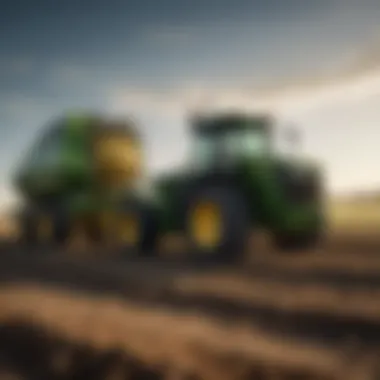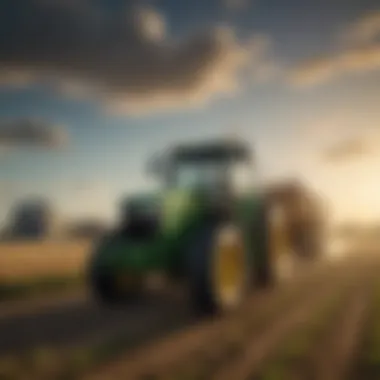John Deere's Influence on Orlando Agriculture


Intro
John Deere stands as a symbol of innovation and reliability in agriculture. In Orlando, its impact transcends equipment sales; it integrates into the fabric of the local agricultural community. Understanding this influence involves examining its advanced technologies, sustainable practices, and partnerships that foster efficiency. This article aims to explore how John Deere shapes the agricultural landscape in Orlando, making it not just about the products but about the holistic transformation of farming practices that prioritize productivity and environmental stewardship.
Key Concepts and Terminology
Definition of Terms
To navigate John Deere's influence, a clear understanding of some concepts is essential:
- Precision Agriculture: This refers to farming management using information technology. It allows farmers to optimize yields and resource use by analyzing data.
- Sustainability: In agriculture, this pertains to practices that meet current farming needs without compromising future generations' ability to meet theirs.
- Innovation in Equipment: This encompasses advancements in machinery and technology aimed at improving productivity and reducing labor.
Overview of Relevant Practices
John Deere employs various methods in Orlando's agriculture:
- Data-Driven Decision Making: Farmers use analytics to guide planting strategies, predicting crop outcomes more accurately.
- Efficient Machinery Use: John Deere devices are designed for fuel efficiency, reducing overall operational costs.
- Community Engagement: Through partnerships with local farms and educational initiatives, John Deere promotes best practices in agriculture.
Current Trends and Innovations
Latest Research and Developments
Recent advancements highlight how John Deere stays ahead of the curve:
- The introduction of autonomous tractors enhances flexibility for farmers, allowing for longer operational hours with less manual labor.
- Smart irrigation systems are gaining traction, helping farmers optimize water use even in times of drought, which is critical in Florida's climate.
Emerging Technologies and Tools
Key technologies that shape agriculture today include:
- Drones: Utilized for monitoring crop health and applying fertilizers efficiently.
- Telematics: Collects and analyzes data from machinery, providing insights that lead to better overall farm management.
Practical Applications
Step-by-Step Guides
To implement John Deere's innovations, farmers can follow a structured approach:
- Conduct a Needs Analysis: Assess the specific needs related to machinery and practices on the farm.
- Invest in Technology: Choose equipment that aligns with the identified needs, such as GPS-enabled tractors or sensors.
- Training: Engage in available training sessions offered by John Deere for effective usage of equipment and technology.
Troubleshooting Common Issues
Even with advanced technology, challenges can arise. Here are ways to address common issues:
- Equipment Malfunctions: Regular maintenance checks can prevent unexpected breakdowns.
- Data Overload: Simplifying analytics by focusing on key metrics can aid in decision-making for farmers.
John Deere's innovative approach illustrates its commitment to enhancing agricultural practices for sustainable growth in Orlando.
Understanding these elements allows for a clearer picture of how John Deere contributes to shaping modern agriculture in Orlando and supports farmers in adopting efficient, sustainable practices.
Prelude to John Deere
John Deere is a name synonymous with agriculture and farming equipment, having established itself as a leader in this vital industry. This section provides essential context for understanding the significance of John Deere's role in shaping modern farming practices and technology. By exploring its brand identity and historical journey, readers can appreciate how John Deere has influenced the agricultural landscape, especially in locales like Orlando.
Overview of the Brand
Founded in 1837 by blacksmith John Deere, the company has evolved remarkably over nearly two centuries. Its mission has consistently centered around providing farmers with innovative tools that enhance productivity and efficiency. Today, John Deere offers a wide range of products beyond tractors, including harvesting equipment, planting machinery, and precision agriculture technologies. The company's green and yellow branding is instantly recognizable, reflecting a commitment to quality and sustainability in farming.
John Deere's operations extend globally, yet its impact is particularly pronounced in the United States, where it remains a primary supplier for American agriculture. This strong presence allows John Deere to understand local needs, catering specifically to the diverse practices of regions such as Orlando.


Historical Context
The evolution of John Deere parallels many significant changes in agriculture. The Industrial Revolution sparked newfound productivity, ushering in a demand for more advanced farming tools. As the need for mechanization grew, John Deere was quick to adapt and innovate. Key milestones, such as the introduction of the steel plow in the 1830s and later advancements in tractor technology, positioned the brand as a trailblazer.
Throughout the 20th century, the company made substantial investments in research and development, leading to innovations like the John Deere Model A tractor, which became a symbol of efficiency. This focus on progress continues today, with John Deere embracing technology such as precision agriculture, which leverages GPS and data analytics to assist farmers in making informed decisions.
As a result, John Deere has not only thrived but has also helped support and shape the agricultural sector’s growth. Understanding this historical context is crucial for recognizing the current and future impacts of John Deere in places like Orlando, where agriculture remains a key part of the economy.
The Agricultural Landscape of Orlando
The agricultural landscape of Orlando is rich and diverse. This region plays a significant role in providing fresh produce and sustenance to the local community and beyond. Understanding this landscape is crucial to grasping how John Deere contributes to modern farming practices in this area. With a blend of climate, soil quality, and technological advancements, Orlando has become a hub for agricultural innovation.
Agriculture in Orlando encompasses various sectors, including horticulture, livestock, and row crops. The climate, characterized by warm temperatures and sufficient rainfall, supports a wide range of crops. This environment fosters productivity, making it essential for farmers to adopt efficient practices and advanced technologies to remain competitive in today's market.
Overview of Agriculture in Orlando
Orlando's agriculture has evolved over time. Historically known for citrus production, particularly oranges, the industry diversified significantly. Today, various crops are cultivated, including tomatoes, bell peppers, and blueberries. The presence of farms, both large and small, contributes to a vibrant local economy.
The focus on sustainability has become increasingly vital. Farmers are exploring methods to reduce their environmental impact while maintaining productivity. By utilizing advanced equipment and technologies, including those offered by John Deere, local growers can optimize their operations, thereby supporting both the economy and the environment. Moreover, local regulations and community support encourage sustainable practices, which are essential for the long-term success of agriculture in the region.
Key Crops and Farming Practices
The range of crops grown in Orlando requires specific farming practices tailored to each type. Here are some noteworthy aspects of the agricultural practices:
- Citrus Fruits: Traditionally, oranges are a staple crop. Integrated pest management and drip irrigation practices are common to enhance fruit quality while conserving water.
- Vegetable Cultivation: Salad crops like lettuce and greens typically utilize crop rotation and cover cropping to improve soil health.
- Berry Production: Blueberries have gained popularity in recent years. Farmers often apply precision agriculture technologies to monitor crop health and yield.
These practices are not only about maximizing output but also about ensuring the long-term health of the soil and ecosystem. The integration of John Deere’s innovative machinery supports these efforts. Their precision agriculture tools help farmers collect data, manage resources efficiently, and improve decision-making across diverse farming scenarios.
"Agricultural innovation holds the key to sustainability in Orlando's farming landscape."
Understanding the agricultural landscape of Orlando is crucial for anyone interested in the impact of John Deere in this area. This knowledge allows farmers to leverage advanced technologies for better yields, ensuring the future prosperity of their operations.
John Deere's Product Offerings
John Deere plays a pivotal role within the agricultural framework of Orlando through its extensive product offerings. The firm is committed to advancing farming practices with innovative machinery and technologically savvy tools. This section will emphasize specifically how John Deere's equipment not only enhances productivity but also aligns with modern agricultural goals, particularly sustainability.
Tractors and Machinery
John Deere's tractors and machinery are at the heart of their product range. They provide efficient solutions that meet the demanding needs of diverse agricultural practices.
Types of Tractors
There are various types of tractors that John Deere produces, each tailored to specific farming needs. These tractors range from compact to large models, catering to everything from small personal farms to extensive agricultural operations. The ability to select a tractor based on the scale and type of operation makes these tractors a popular choice among farmers.
A unique feature of the John Deere tractors is their adaptability with various attachments, which helps in performing multiple tasks—plowing, planting, and harvesting. This flexibility can lead to improved productivity and reduced operational costs in Orlando's agricultural landscape.
Features and Specifications
The features and specifications of John Deere's machinery further contribute to their effectiveness. For example, tractors often come equipped with advanced engine technology that enhances fuel efficiency and reduces emissions. This has proved beneficial in helping farmers comply with environmental regulations.
One standout specification is the ergonomic design that prioritizes operator comfort. This helps to reduce fatigue during long working hours, making it easier for farmers to remain productive.
Precision Agriculture Tools
As agriculture evolves, precision farming becomes increasingly essential. John Deere offers several precision agriculture tools designed to enable farmers to make data-driven decisions.
GPS Technology
GPS technology is one of the critical components of John Deere's precision agriculture toolkit. This technology allows for enhanced navigation and tracking of farm machinery. It greatly contributes to efficiency in field operations by enabling precise planting, spraying, and harvesting.


John Deere's GPS system is unique in its accuracy, which reduces overlap and underlap during farming tasks. This results in lower waste of resources, such as seeds and fertilizers, contributing to a more sustainable approach to farming.
Data Management Solutions
Data management solutions play a crucial role in modern agriculture. John Deere provides platforms that allow farmers to collect, analyze, and act upon data gathered from their fields. These solutions enable the optimization of inputs and the enhancement of crop yields based on real-time information.
One significant advantage of this technology is that it helps farmers to make informed decisions efficiently. However, managing large volumes of data can be challenging for some farmers who may lack digital literacy.
"The integration of advanced tools significantly reshapes farming efficiency and sustainability."
By focusing on John Deere's product range, we can see that their profound influence not only enhances agricultural output but also fosters a more sustainable future for Orlando's farming community. Through continued innovation, John Deere demonstrates a steadfast commitment to supporting local farmers in overcoming the challenges they face in a rapidly evolving agricultural landscape.
Impact on Sustainability Practices
Sustainability in agriculture has become essential for modern practices. The importance of examining how John Deere contributes to sustainable farming is critical for both environmental health and economic viability. The integration of sustainable technologies not only reduces resource inputs but also enhances yield and profitability. In an area like Orlando, where agriculture may compete with urban expansion, sustaining farming practices is not just a trend but a necessity.
Innovations in Sustainable Farming
John Deere has incorporated numerous innovations to promote sustainable farming methods. For instance, precision farming is a key aspect. This technology utilizes GPS and data analytics to optimize resource use. Farmers can assess soil conditions and manage their inputs more effectively. The result is a reduction in waste, increased efficiency, and a lower ecological footprint.
Furthermore, John Deere's cover crop solutions help in soil conservation. By planting cover crops, farmers can improve soil health while preventing erosion and nutrient depletion. These practices are crucial in maintaining the land's productivity without overusing harmful chemicals, which have long-term adverse effects on ecosystems.
Innovative equipment, such as the John Deere 8R Series Tractors, also reflects advancements in fuel efficiency and emissions reduction. This not only lowers operating costs for farmers but also aligns with the broader goals of reducing agriculture's carbon footprint.
John Deere's Commitment to Environmental Stewardship
John Deere's commitment to environmental stewardship is evident in its various initiatives aimed at sustainable development. The company actively engages in efforts to reduce the environmental impact of its operations. This involves investing in renewable energy solutions in manufacturing and embracing recyclable materials in product designs.
Moreover, John Deere collaborates with local governments and organizations to promote conservation programs. These programs advocate for sustainable practices to enhance water quality and biodiversity. Such efforts underline their responsibility towards both the community and the environment.
In addition, John Deere supports research initiatives focused on sustainable agricultural practices. By funding studies that seek innovative solutions to farming challenges, they help foster a culture of sustainability in Orlando's agricultural sector.
"It is clear that sustainable agriculture is not just beneficial; it is essential for the future of farming in regions like Orlando. John Deere's proactive role exemplifies a commitment to ensuring agricultural coexistence with nature."
Local Partnerships and Community Engagement
Local partnerships and community engagement are pivotal elements in analyzing the impact of John Deere in Orlando's agricultural scene. The interplay between technological advancements and local farmer practices is essential for maximizing productivity and sustainability. John Deere actively participates in nurturing these relationships, which creates a supportive ecosystem that benefits both farmers and the community at large.
These partnerships often lead to shared resources and knowledge. When John Deere collaborates with local farmers, the exchange of insights contributes to better practices and increased efficiency. Farmers benefit from access to state-of-the-art equipment and technology, while John Deere gains valuable feedback regarding equipment performance in local conditions. This mutualistic relationship promotes innovation tailored to regional agricultural challenges.
Another significant advantage is the impact on community resilience. Strengthening local networks not only enhances agricultural practices but fosters a culture of collaboration. The sharing of resources, from machinery to educational materials, creates a robust framework for growth.
Furthermore, partnerships often lead to job creation and economic development. By working together, local businesses and John Deere can stimulate the economy, benefitting a wide array of stakeholders, from farmers to retailers.
"Local partnerships are not just beneficial; they are crucial for the sustainability of agriculture in Orlando,” remarks Emily G., a local agronomist.
Collaborations with Local Farmers
Collaborating with local farmers is central to John Deere's strategy in Orlando. These collaborations provide farmers with the necessary tools and expertise required to thrive in a competitive agricultural environment. Often, these partnerships include demonstrations and pilot programs, which help farmers understand and implement the latest technologies.
John Deere instigates hands-on workshops where local farmers can directly interact with machinery and learn about precision agriculture. These experiences are invaluable since they offer practical knowledge that cannot be gained from manuals alone. Additionally, John Deere's staff are usually on hand to provide tailored advice, ensuring that farmers can effectively use the equipment.
Moreover, the choice of focusing on cooperative models allows farmers to access expensive machinery more affordably. The sharing of equipment through local partnerships minimizes individual costs, allowing farmers to invest savings back into their operations. This approach fosters a community spirit, thus enhancing cooperation amongst farmers.
Educational Programs and Resources
Education plays a fundamental role in empowering local farmers and ensuring they are well-equipped to face the challenges of modern agriculture. John Deere's commitment to education is evidenced through various programs aimed at enhancing the skills and knowledge of the agricultural workforce.
John Deere also partners with local educational institutions to create tailored training programs in agricultural technology. These programs focus on practical skills needed to operate advanced equipment effectively. Workshops, online courses, and hands-on demonstrations provide farmers with flexible learning opportunities.


Furthermore, John Deere supplies resources, such as manuals and guidance documents, that help farmers navigate advanced systems. The accessibility of these educational materials ensures that all stakeholders, whether seasoned farmers or newcomers, can benefit from current knowledge and best practices in agriculture.
Challenges and Considerations
The agricultural landscape is marked by various challenges and considerations that farmers must confront. As John Deere continues to influence this sector in Orlando, understanding these elements is vital for assessing the company's impact. Market competition and the need for adapting to emerging technologies stand out as significant factors that shape farming practices today.
Market Competition
In today's agricultural sector, competition is fierce. Local farmers frequently face pressures from larger agricultural companies that have access to resources that may not be available to smaller operations. John Deere, as a major player, must navigate these competitive hurdles while providing value to its clientele. This means developing innovative solutions that help farmers improve efficiency and productivity.
The competitive landscape also drives pricing strategies. As manufacturers, John Deere must find a way to balance quality and affordability. When facing rivals like Caterpillar and Kubota, equal or better pricing on superior technology becomes crucial. Farmers often turn to brands they trust, making customer loyalty a key component amidst competition.
Adapting to Emerging Technologies
The introduction of emerging technologies is transforming traditional farming practices. From GPS technology to data management systems, these advancements create opportunities for improved efficiency and yield. John Deere's focus on precision agriculture tools is noteworthy. However, adopting new technologies often comes with challenges as well.
Farmers need training to use advanced tools effectively. There may also be resistance to change due to the comfort of established methods. Not all farmers can afford cutting-edge technology either, which raises the question of accessibility.
Keeping pace with technological advances is paramount for John Deere. To remain a leader, it must continue to innovate while also ensuring that these innovations are practical and accessible for farmers of all sizes.
"Adapting to new technologies is no longer optional for survival in the agricultural industry."
In summary, the market competition and the necessity of adapting to emerging technologies are critical elements in understanding John Deere's role within Orlando's agricultural landscape. Both aspects present challenges but also opportunities for cooperation and growth, propelling the industry toward a more modern and sustainable future.
Future Prospects for John Deere in Orlando
The future prospects for John Deere in Orlando represent a critical dimension in understanding the ongoing evolution of the agricultural landscape. As farmers and agricultural professionals continuously seek to maximize efficiency and optimize productivity, the role of advanced machinery and technology becomes increasingly vital. John Deere's commitment to innovation and adaptability positions it favorably within this dynamic environment. The convergence of local agricultural needs with cutting-edge technology will dictate how effectively John Deere can serve the Orlando area.
Predicted Trends in Agriculture
The agriculture industry is evolving rapidly, shaped by various predicted trends that are set to influence farming in Orlando. These trends include:
- Sustainability: Increasing pressure from consumers for environmentally friendly practices encourages farms to adopt sustainable methods. This will lead to a heightened demand for John Deere's innovations in sustainable farming technologies.
- Data-Driven Farming: The rise of Big Data will allow farmers to make better decisions based on analytics. Tools that provide insights into crop performance and soil health are expected to be integrated into operations more extensively.
- Automation: The adoption of automation technologies will increase efficiency in farming practices. John Deere's focus on developing automated machinery makes it well-suited for this trend.
- Climate Resilience: Florida's climate presents unique challenges. Innovations that enhance crop resilience to temperature extremes, drought, or flooding will be highly sought after, creating robust opportunities for John Deere's product lines.
John Deere must continue to monitor these trends to adapt its offerings accordingly, ensuring alignment with the evolving needs of farmers in Orlando.
Potential Innovations on the Horizon
Looking at the horizon, several potential innovations present exciting possibilities for John Deere in Orlando's agricultural market. These innovations include:
- Enhanced Crop Monitoring: With advancements in drone technology and IoT devices, John Deere could provide farmers with real-time data collection options that improve crop management and yield forecasting.
- Smart Tractors: Future designs could be equipped with advanced AI capabilities to assist in diagnostics, predictive maintenance, and real-time operational adjustments, which can drastically reduce downtime.
- Vertical Farming Equipment: As urban agriculture grows, technologies enabling vertical farming could become more relevant. John Deere might explore equipment specifically tailored for such practices.
- Bioengineering Solutions: Collaborating with biotechnological firms to develop machinery that can plant genetically modified crops more efficiently could position John Deere as a leader in bioengineering solutions.
It is crucial for John Deere to explore these innovations while maintaining strong connections with local farmers. Such collaboration can lead to refining products that specifically meet the needs of Orlando's agricultural sector.
"Innovation in agriculture is not just about new products but about building relationships with the communities we serve. This is central to our mission going forward."
In summary, the future prospects for John Deere in Orlando are grounded in a commitment to technological advancements and understanding the regional agricultural landscape. By being at the forefront of emerging trends and potential innovations, John Deere can significantly influence the agricultural direction of Orlando.
Finale
The analysis of John Deere's influence in Orlando's agricultural setting underscores the profound impact technology can have on farming. This conclusion synthesizes the insights gathered from various sections of the article, emphasizing key themes like innovation, sustainability, and community engagement, which are essential to understanding John Deere's role in modern agriculture.
Summary of Key Insights
John Deere's contributions to Orlando's agriculture are multifaceted. The brand offers cutting-edge machinery and precision tools, which enhance productivity and efficiency for local farmers. Key insights include:
- Technological Advancements: John Deere integrates advanced features in its equipment, including GPS capabilities. This allows farmers to optimize their farming practices by managing resources more effectively.
- Sustainability Efforts: John Deere's commitment to sustainable farming practices is evident through its innovations aimed at reducing environmental impact. Many local farmers have adopted these practices, ensuring the longevity of their operations.
- Community Engagement: The partnerships between John Deere and local agricultural entities foster a spirit of collaboration. Educational programs guide farmers in utilizing these technologies effectively, demonstrating John Deere's investment in the community.
Final Thoughts on John Deere's Role
Considering the insights presented, it's clear that John Deere plays a pivotal role in shaping the future of agriculture in Orlando. The company is more than just a provider of equipment; it acts as a partner in progress for many farmers. The emphasis on technology not only enhances productivity but also promotes sustainability, addressing the pressing challenges faced by modern agriculture.
In summary, John Deere's enduring commitment to innovation, sustainability, and community involvement will likely continue to influence the agricultural landscape of Orlando. This impact serves as a model for how agricultural companies can collaborate with local communities to foster growth and resilience in an ever-changing economic environment.
"John Deere exemplifies how modern farming can be revolutionized through technology, reflecting the needs and aspirations of today's agricultural society."
This conclusion reinforces the relevance of the topic and suggests that ongoing engagement and adaptation will be essential for the future of agriculture in the region.







